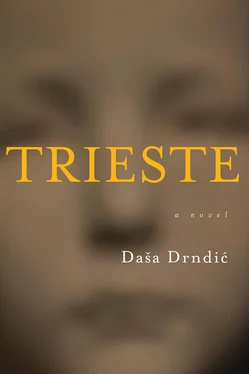Haya comes across the news of the opening of Bad Arolsen in the newspapers L’Unità and Corriere della Sera. It is a small news item, appearing at the bottom of the fifth and sixth page, respectively, of the newspapers Haya regularly reads. Haya reads many papers. By this time she has experience with newspapers. Haya snips out the article about the opening of the German archives and places it on the desk by the window. Soon, she says. Soon it will be time to go to Bad Arolsen. There is no-one around to tell Haya, Take it slow, Haya. It is too soon to start packing. Bad Arolsen is not yet open, and you are old.
Anyway. After the news that the Bad Arolsen archive might soon be opening its doors, Haya decides: I am coming back among people. It is springtime. I will hold a little dinner party for my closest friends. Yes, Haya is old. The preparations for the dinner take a long time. For a week Haya brings home food supplies, bottles of Merlot and Picolit, fresh vegetables, strawberries are available, she gets prosciutto, prosciutto di San Daniele, she has no flour at home, no sugar, she buys asparagus, gli asparagi della Bassa friulana, she has no cooking oil, she buys spring beans and potatoes, i fagioli e le patate della Carnia, she buys cheeses, especially formaggio Montasio. Haya doesn’t eat much, mostly Zwieback , on the day of her dinner Giovanni the fisherman leaves at her door trout he has just caught, lovely, plump trout, le trote del Natisone, oh, it will be a feast, a real feast after so many years of fasting. Haya gets out her fine glasses, the ones with the gold rim. She washes them so they glisten. She takes out her special tableware. Carla comes over. Carla cleans the house. The windows gleam, the floor gleams, there is a sense of gaiety in the air, a long-since-vanished gaiety that now sticks to the sun’s rays, and prances with them, prances like flies driven mad by impending rain. And Freddy, Freddy comes over, to braid a black velvet ribbon into her heavy grey hair.
No-one comes.
Everyone is busy. They all apologize. We’re busy, they say. Fanny is busy, Igor is busy, Albina is busy, Frau Helga, nicknamed “Hitlerchen”, is also busy, Don Sebastian is busy, Olga is busy. Who else had she invited? she can’t remember just then. She invited Roberto. She invited Roberto, and Roberto is busy. All her guests, all twelve of her guests are busy. They have more pressing things to see to. Haya can’t remember what these things are, pointless things, yes, she doesn’t remember what they are busy with, who they are busy with. No-one comes to her little party, to the last dinner of her fast, to her return to the living.
So what? That’s fine. Bad Arolsen will open and she will go there.
Arolsen will open and I will go to Arolsen, Haya says. And further she says, I would like my name to be Babette. Babette knows about feasts. Eating and celebrating are ordinary deceptions, she says. Waiting lasts, waiting endures.
What’s with Zion? Divine salvation? Ridiculous. What does he have in mind, this God, this god of the Jews, this god of the Christians, that a feast can bring salvation, that one little feast can overpower death, plough up the cemetery in her breast? Ha! Reconciliation? One big or little bash, either way, will that bring liberation? How, on a platter?
Listen, Haya, I know something about this. It’s true, salvation is, in human terms, absolutely unattainable; but everything is possible for God! This is a struggle of faith, which, if we can say so, fights madly for possibility. Possibility is the only force that saves… At times the inventiveness of the human imagination may be enough to create possibility, but ultimately this means when one should believe, the only thing that helps is that everything is possible for God.
Leave me, Kierkegaard. I don’t feel like talking. This little gastronomical defeat is an ordinary “decoration”. There is no despair in it. I am too old for new despair.
Despairing is not a trait of the young alone. No-one outgrows the way that one “moves beyond an illusion”. But an illusion cannot be outgrown and no-one is so mad as to believe that. Indeed, we will often run into men and women and the elderly who have more childish illusions than any young man or woman. But we forget that illusion has essentially two forms: the form of hope and the form of recollection. Youth has the illusion of hope, age — the illusion of recollection.
My recollections are not illusions. They are not the past. My memories are my present.
This past-present of yours is perhaps something that remorse, in fact, should be dealing with. But for there to be remorse, one must first reach the ultimate point of despair, and spiritual life must reach its foundations. This is difficult. Young people despair for their future as a present in futuro . You despair because of the past as present in praeterito.
I despair because I remember. Leave me, Kierkegaard. Don’t you see that time has arranged itself in circles? The past is reality. The past is a factual state. The past is a fait accompli. But the future offers branching possibilities. Think a little about temporal logic. I am fine with my despair. As with my solitude.
Yes. Only the breed of incoherent, talkative people, this herd of the inseparables, feels no need for any kind of solitude, because they, like little parakeets, die immediately, as soon as they are for a moment left alone. Preserve your despair.
I know. You keep saying that. “Despair — a sickness from which one languishes but does not die. Sickness unto death.” You talk too much, Kierkegaard. I don’t need language any more. Numbers and a few letters suffice, because everything is in formulas, everything.
May I say something?
Who are you?
Pound, the crazy poet
Speak, Pound, tell Kierkegaard.
And the betrayers of language
……… n and the press gang
And those who had lied for hire;
the perverts, the perverters of language,
the perverts, who have set money-lust
Before the pleasures of the senses […]
The slough of unamiable liars,
bog of stupidities,
malevolent stupidities, and stupidities,
the soil living pus, full of vermin ,
dead maggots begetting live maggots,
slum owners ,
usurers squeezing crab-lice, pandars to authority,
pets-de-loup, sitting on piles of stone books ,
obscuring the texts with philology,
hiding them under their persons,
the air without refuge of silence,
the drift of lice, teething ,
and above it the mouthing of orators ,
the arse-belching of preachers.
And Invidia,
the corruptio, fætor, fungus,
liquid animals, melted ossifications,
slow rot, fætid combustion,
chewed cigar-butts, without dignity, without tragedy,
….. m Episcopus, waving a condom full of black-beetles,
monopolists, obstructors of knowledge.
obstructors of distribution.
So it is that in 2006 Haya largely stops speaking; she mainly listens to ghosts. And waits.
I stand at the door to the “baths”; under a tree I see a small orchestra: three Jews, yellow stars on their chests, are singing, and three are playing instruments. They have a violin, a mandolin and a flute. The S.S. men like music. They love it when there is playing and singing. They dance at night in their club. The club at Treblinka is called “Casino”. A little orchestra plays the latest hits. Artur Gold performs his popular tango “Autumn Roses”. In the rhythm of autumn roses people go off to the “showers”. They march to the sounds of the violin. The S.S. men smile wistfully.
Читать дальше












